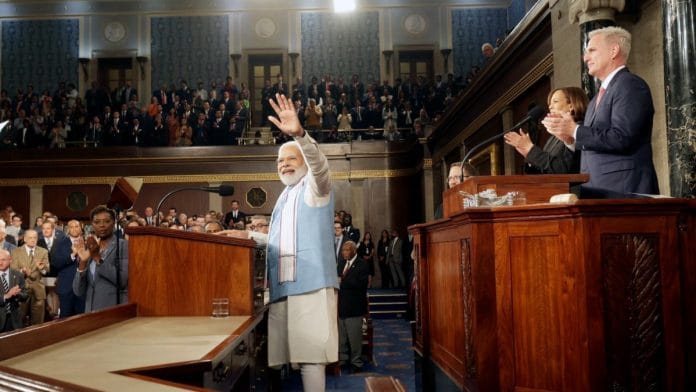New Delhi: From counter-terrorism, diversifying supply chains and a joke about the growing number of Indian-origin politicians in the US to veiled references about China and debt traps, Prime Minister Narendra Modi touched on a range of topics during his second address to the US Congress Friday.
The last time Modi addressed the US Congress was in 2016 during the then Obama administration. He is the only Indian PM to have done so twice.
In his hour-long address to US lawmakers at a joint session of the US Congress, Modi called the US one of India’s most important defence partners and also highlighted how the Ukraine war has affected the developing countries.
The Prime Minister also commented on the growing Indian diaspora in the US, including a number of Indian-origin members in the Congress. “I am told that the Samosa Caucus is now the flavour of the House,” he joked, and also took note of Indian-origin US Vice President Kamala Harris “who has made history” as the first woman of colour to hold the position.
These remarks came two days after over 70 politicians, led by US Representative Pramila Jaypal, who is of Indian origin, urged US President Joe Biden through a letter to discuss the importance of protecting human rights and democratic values in India during his talks with Modi.
However, Jaypal was seen giving the Prime Minister a standing ovation after his address.
During a press conference Thursday, Biden had confirmed that the issue of human rights was raised during talks and added that democracy is the “DNA” of both nations. Meanwhile, PM Modi denied that religious discrimination exists in India.
Veiled references to China
During his address to the Congress, PM Modi made veiled references to China and the alleged debt traps it has created for developing countries while speaking about his vision for the Indo-Pacific.
“The dark clouds of coercion and confrontation are casting their shadow in the Indo Pacific,” said Modi, emphasising that it has become a central concern of the US-India partnership.
The Indo-Pacific should be free from domination, where progress is not “suffocated by impossible burdens of debt” and where connectivity is not “leveraged for strategic purposes”, he added.
He also described the Quad as a force of good in this regard.
In what appeared to be a veiled reference to Pakistan, the Prime Minister talked about Indo-US cooperation to counter terrorism and radicalisation in the world, by citing past events such as the 9/11 bombings and the 26/11 Mumbai attacks. “We must overcome all such forces sponsoring and exporting terror,” he said.
Diversifying supply chains, leveraging iCET
On economic and technological cooperation between the US and India, the Prime Minister praised the Initiative on Critical and Emerging Technologies (iCET) and called on both the countries to diversify global supply chains.
“One consequence of globalisation has been the over-concentration of supply chains. We will work together to diversify, decentralise, and democratise supply chains,” said Modi.
“That is why our two countries established a new ‘Initiative for Critical and Emerging Technologies’,” he added. Formally launched in January, the iCET is a framework for Indo-US cooperation on artificial intelligence, quantum computing, semiconductors, wireless telecommunication and more.
PM Modi also encouraged further bilateral cooperation between the two countries on semiconductors and critical minerals. American firm Micron Technology has announced an investment of over $800 million for semiconductor assembly and a test facility in India.
(Edited by Smriti Sinha)
Also read: From jet engines to drones, space and 6G – Big takeaways from PM Modi’s US visit






